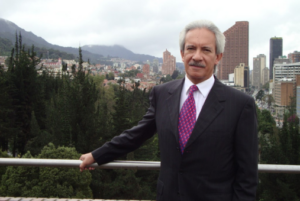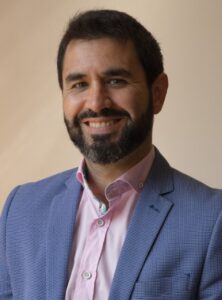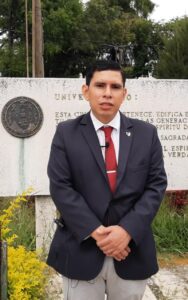The arrest of José Rubén Zamora, journalist, founder and president of elPeriódico newspaper in Guatemala, has drawn international attention to the worsening of press freedom and the right to information in the country. Journalists interviewed by LatAm Journalism Review (LJR) said that the arrest of one of the best-known names in Guatemalan journalism is a serious development in the escalation of attacks against the press critical of President Alejandro Giammattei's administration.
“Zamora's arrest was the Giammattei government's worst blow to freedom of expression, critical media and independent journalists,” Héctor Coloj, coordinator of the Guatemalan Journalists Association (APG, by its Spanish acronym), told LJR.

José Rubén Zamora, Guatemalan journalist, founder and president of elPeriódico (Courtesy)
The APG has been monitoring attacks against the press for years, and has noted 2020, Giammattei's first year in office, as the period with the most attack records: there were 149, while in the previous year, 2019, 85 assaults were recorded. In 2021 there were 136 records and in 2022, as of Aug. 22, 86 cases have been recorded, Coloj said. Among the cases recorded are obstruction of access to sources, threats, judicial harassment, material and physical assault, murder, intimidation, defamation, and censorship.
“The State promotes a permanent campaign of political persecution against journalists and all voices critical of the regime. Also against participants in citizen demonstrations. This is reflected in criminalization processes undertaken by the Public Prosecutor's Office (MP) and supported by the Judicial Organism (OJ),” states the APG observatory's latest biannual report, released in July.
According to the document, “in addition to these practices, there are hate campaigns disseminated on social media, the monitoring of people who make authorities uncomfortable, the withholding or denial of public information by officials, the prohibition of the press to enter public events, the disinterest of the MP to prosecute attacks and crimes against journalists, and in recent months, the increase of a confrontational discourse that appeals to the ‘defense of national sovereignty’ and seeks to implant in the social consciousness sectors critical of the government such as the press or leaders and representatives of Indigenous peoples as ‘enemies of democracy’ and ‘destabilizers.’
For journalist Marielos Monzón, columnist for Prensa Libre newspaper and one of the organizers of the collective Prensa contra la Censura and the #NoNosCallarán initiative, Zamora's arrest means that “the authoritarian regime that Alejandro Giammattei and his partners in an impunity pact have built in recent years in Guatemala has been consolidated.”

Marielos Monzón (Courtesy)
“And it adds to the harassment, persecution and harassment that dozens of journalists have been suffering in recent years. The objective of the capture and arrest of José Rubén Zamora is an attempt to silence the press. The prominence of Zamora and elPeriódico, being an emblematic news outlet of investigative journalism, is also intended to send a message. The message is: if you are a critical journalist, if you do your job, we are going to silence you,” Monzón said.
Enrique Naveda, one of the founders of the digital news outlet Plaza Pública and current John S. Knight Scholar at Stanford University in the United States, considers that “Zamora is a rather controversial figure in national journalism, but he is also and above all a symbol,” he told LJR.
“The fact that they captured him with such fanfare and that he is being prosecuted in a trial that is clearly rigged is a wake-up call to all other journalists. It is, above all, a demonstration of an absolute lack of protection against this quasi-dictatorial, authoritarian power that President Giammattei is exercising with the support of the other State agencies and a good part of the organized business community,” Naveda said.
LJR contacted the General Secretariat of the Presidency of Guatemala by email, but obtained no response as of the closing of this article.
On July 29, José Rubén Zamora was arrested at his home on charges of blackmail, money laundering and influence peddling. Instead of ringing the doorbell, police officers broke into his house by entering an inner courtyard through the roof, even though they had a search and seizure warrant, as Salvadoran website El Faro reported. While the police carried out the operation in the journalist's house, other agents occupied elPeriódico's newsroom and held the newspaper's employees there incommunicado for 16 hours.
The first hearing in the case was held on Aug. 9, when Judge Freddy Orellana accepted the charges brought by the Prosecutor’s Office against Zamora in a case assembled within 72 hours, according to El Faro. The judge also denied the defense's request for the journalist to answer the case in freedom or under house arrest, on the grounds that he was a flight risk. However, the journalist's lawyer stressed that Zamora has already faced 185 trials in Guatemalan justice and had never attempted to flee, El Faro reported. The next hearing in the case is scheduled for Dec. 8, and until then, Zamora is expected to remain in prison.

Enrique Naveda (Courtesy)
Organizations such as the Committee to Protect Journalists (CPJ), the Inter American Press Association (IAPA), and the Voces del Sur Network, which brings together organizations that defend democracy and freedom of the press in Latin America, have spoken out about the case. Voces del Sur said it was an "arbitrary detention." The CPJ classified the case as "judicial persecution" and demanded Zamora's immediate release. And the IAPA noted that “the spectacular and disproportionate nature of the raid operations make it appear that the government is seeking to intimidate journalists and the media that scrutinize the government.”
Zamora is one of Guatemala's best-known journalists, having received several international recognitions for his work as well as violent attacks over the decades in his country. Among the awards Zamora has received are the Maria Moors Cabot Award from Columbia University (1995) and the CPJ International Press Freedom Award (1995). In 1996 he founded elPeriódico, which remains one of Guatemala's leading newspapers, consistently producing investigations into cases of corruption in public administration. In 2021, elPeriódico received the King of Spain Award as the outstanding news outlet in Ibero-America.

Héctor Coloj (Courtesy)
The journalist has also been the target of several attacks, including a 2003 raid on his home, when he and his family were held hostage for several hours, and a 2008 kidnapping, when he was drugged, beaten, and left unconscious on a roadside. Zamora has also faced several criminal charges, including being prosecuted more than once under the country's Feminicide Law by female state employees who accused him of "psychological violence," after being named as suspects in corruption cases investigated by elPeriódico.
Coloj considers Zamora's arrest to be part of a “campaign of hunting, harassment and violence against human rights by the State of Guatemala,” which dates back to the administration of Jimmy Morales, who was president from January 2016 to January 2020. Other journalists interviewed by LJR also traced the beginning of the government's escalation of attacks against the press back to the administration prior to Giammattei. However, they emphasized that the current president has intensified this trend.
According to Elsa Coronado, reporter at Plaza Pública, “since the beginning of the Giammattei administration, there has been a rupture.”
“They promised openness and did not deliver. The first year of his administration coincided with the first year of COVID-19 and this helped him avoid a relationship with the media. In the face of criticism and questioning, the president closed the doors and has publicly criticized journalists for lying to the public. His strategy, since the beginning of his administration, has been not to give interviews to independent news outlets and reporters. Instead, he is more than willing to visit the television sets of Angel Gonzalez's Albavisión group, where he is treated with condescension,” Coronado told LJR.

Elsa Coronado (Courtesy)
Coloj said the national government's hostility toward the press has permeated institutions at the local level. “These same attitudes have also been replicated in departments, in municipalities, with departmental governors or district deputies who seek in some way to limit the work of journalists by not answering questions or by responding in a rude or intimidating manner to questions they do not like, inviting only media they like, or using official advertising to reward, punish or constrain journalists,” he said.
Journalist Julie López, who writes for El Faro, also spoke to LJR about the local aspect of hostility and repression against journalists. She recalled that in recent years there have been several cases of professionals who do local coverage being arrested and criminalized for doing their work. This was the case of Indigenous journalist Anastasia Mejía, who was arbitrarily detained for more than a month between September and October 2020 and then spent almost a year under house arrest.
For López, the impact of Zamora's arrest on Guatemalan journalists also varies because of this difference between local coverage, in the municipalities and departments, and national, in the country's capital.
“There are a certain number [of journalists], especially in the capital, who are more frightened when they realize what the Public Prosecutor's Office can become,” López told LJR. “But voices are also divided because of course, mentioning that Zamora has a much higher profile, is more internationally known, etc. That is one thing. But there are several journalists in the interior who have spent days or weeks in jail, like again the case of Anastasia [Mejía] and they never had the same high profile.”

Julie López (Courtesy)
One of the fears mentioned by journalists interviewed by LJR is that Guatemala could go the way of another Central American country, Nicaragua. Since 2018, dozens of journalists have been detained in Nicaragua and at least 120 have gone into exile, In addition, more than 20 news outlets have had their newsrooms shut down by Daniel Ortega's government.
However, fear has not paralyzed Guatemalan journalists, as highlighted by the professionals heard by LJR. “Contrary to what Giammattei, his political allies, his allies in the private sector and the Attorney General have sought, Zamora's arrest has not provoked a generalized self-censorship. On the contrary, it has strengthened the atmosphere of brotherhood and unity in almost the entire journalistic sector. The media have not remained silent and, as a result of this, investigations have been launched,” which pointed out conflicts of interest of the people involved in the charges against Zamora, Coloj pointed out.
Read below for other thoughts from journalists interviewed by LJR on the current situation of press freedom and its impact on journalists in Guatemala:
On the relationship between Alejandro Giammattei's government and the press
Enrique Naveda: “[The government] has the same relationship with the press as it has with the rest of the social actors. That is to say, it demands subordination and applause. To those who offer subordination and applause, be it the press or any other type of actor, it offers rewards. To those who dissent, it excludes, pressures, and ultimately tries to destroy them. So it is with the press and so it is with other types of organizations. With the press, for example, most of the critical or dissident, independent press is not invited in many occasions to press conferences, is not invited to meetings, is not granted interviews, because it pressures by legal means and, in some cases, like that of Zamora, it even goes as far as the capture of the journalist.”
Julie López: “From the beginning it was a tense relationship that little by little closed off. I believe this government was prone to close spaces of communication. For example, very soon press conferences were spaces where the public official made some announcement, but there was no room to ask questions. Or it was easy to see that only pro-government journalists were allowed to ask questions. Lately, they have also posted audio of statements or press releases that they send via Whatsapp, because journalists do not have the opportunity to ask questions. And, if you have a question or questions about what they sent, they never reply.”
Marielos Monzón: “The administration of Alejandro Giammattei has imposed a dynamic of authoritarian regression, which has been characterized by repression, censorship and limitations on the work of the press and independent media and journalists. This past year, various forms of limitations, aggressions and attacks against the press have multiplied and diversified. For example, a presidency that disrespects the media, a Prosecutor’s Office that in line with some judges fabricate cases and do not investigate abuses against journalists. We are also seeing Public Information Offices of the Executive, Congress and other state institutions that are obliged to be accountable choosing to become a censorship barrier to the right of access to information.”
On the impact of Zamora's arrest and the current situation of journalists in the country
Marielos Monzón: “On the one hand, I believe that we cannot deny that there is fear, that there is anxiety. That we start to think every time we are going to publish a story and that we are investigating a case, that we can be at any moment the victim of a violation and criminalization. This is undeniable and it has a strong impact, let us say, on journalists. We know that at this moment we are at-risk when facing this power that has been built to censor and silence the press. On the other hand, I think it is important to emphasize that we independent journalists have not only shown solidarity with our penalized colleagues, but we have actually organized ourselves in such a way that we have now created an initiative called "They will not silence us." With this initiative we want to show the people of Guatemala what is happening to democracy. Tell them that when a journalist is silenced or a news outlet is censored, this is not only an attack on journalism, this is an attack on democracy and the right of Guatemalan citizens to have information that allows them to make decisions and to know the facts affecting them.”
What does it feel like to be a journalist in Guatemala today?
Julie López: “In my opinion, as things stand, in this country it is less dangerous to cover drug trafficking than to cover corruption. And I am not saying that drug traffickers wouldn't do anything to you, because of course they do, especially in the current context of impunity. But I think that, in reality, as a journalist, you run more risks covering corruption than narcos. And I think that speaks to the state of things, doesn’t it? Given the example of the arrests on Nov. 21, 2020 [when dozens of people were arbitrarily arrested for allegedly participating in demonstrations in Guatemala City] and what they are doing to Zamora, it shows they can grab anyone and bend the law, and there’s nothing you can do about it. So, that is scary.”
Elsa Coronado: “I feel greater responsibility for the current situation in my country. I believe that serious journalism is necessary and urgent. Some people think that by getting journalists out of the way they will be able to act without being bothered, but there are very small and courageous news outlets that are determined to scrutinize power. Where I work, Plaza Pública, important efforts are being made to do investigative and in-depth journalism. We believe that people have the right to access that information and that is our focus and effort. There are other news outlets that are also making great efforts with minimal staff in the city and in communities in the countryside. I’ve observed great commitment at this time despite the dangers.”
Enrique Naveda: “I feel very fearful about the future of the press in Guatemala and of Guatemalan democracy. I am one of those who believe that we can no longer call it a democracy since a long time ago. I believe that we have gone from a hybrid regime, which is how The Economist described it a few years ago, to a clearly authoritarian regime, in which all state institutions now respond to the will of President Giammattei. I do not believe that this is going to change with the elections.”
On the role of the international community
Elsa Coronado: “It is important to pay attention to what is happening here. I know this is a global situation, but we need the world’s solidarity so what we are experiencing does not remain anonymous. Today, I believe we need support networks for emergencies and dangerous situations. Also, to strengthen the awareness of self-protection for journalists, especially young people who bravely decide to follow this profession.”
Marielos Monzón: ‘We need for people to set their eyes on Guatemala and Central America. To realize what could happen if we have a regression and return to a past that we do not want for this region. But above all, we need people to act to defend these principles of democracy and freedom of expression in such a way that the [Guatemalan] government, Congress, and Courts know they will pay dearly for attacking the population and the rights and freedoms of its citizens. In other words, it is not only about sending solidarity messages. It is also about saying that this situation is unacceptable. That there will be consequences for this government and for people who act against rights and freedoms.”